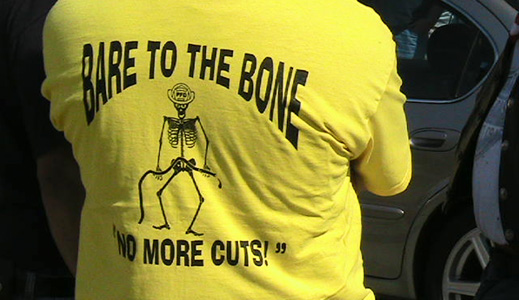
WASHINGTON – Labor leaders met for more than an hour here with President Obama Aug. 2, urging him to focus on jobs for the remainder of his first term.
After the meeting, at which the president defended his record on issues important to labor, the White House announced that Obama will tour the Midwest beginning Aug. 15 to drum up support for a “jobs agenda.”
The president, on national television, shifted discussion away from the debt ceiling deal and declared that the priorities for Congress are passage of measures that will stimulate the sputtering economy, including extending the payroll tax suspension for workers, beefing up benefits for the unemployed and investing in infrastructure projects.
The union leaders who met with Obama, only a day after he signed the hotly contested debt ceiling legislation into law, were members of the AFL-CIO’s general board and executive council. The meeting preceded a three-day session of the federation’s executive council at the National Labor College in nearby Silver Spring, Md.
Obama “goes to sleep and wakes up thinking about jobs,” AFL-CIO Secretary-Treasurer Liz Shuler quoted the president as saying. Shuler said the union leaders and the president did not agree on the debt deal but “we have to move on.”
Jobs, the deficit-debt deal, next year’s election and labor’s enthusiasm – or possible lack of it – for Obama were the prime topics of discussion, according to Shuler, Fire Fighters President Harold Schaitberger, American Federation of Teachers President Randi Weingarten and Alliance for Retired Americans President Barbara Easterling.
Shuler said the president promised to emphasize jobs.
The White House announcement of its Midwest jobs tour yesterday comes against the backdrop of an unemployment rate of 9.2 percent. With almost a fifth of all workers either unemployed or “under-employed,” the actual jobless rate, labor economists note, is much higher.
Easterling called the meeting respectful, adding the leaders did not attack Obama on stands they have disagreed with, including the debt deal’s planned $917 billion in cuts over 10 years in domestic programs. But “they spoke their minds” about it, she said. Before the meeting, the federation issued a statement criticizing the deficit-debt deal as “bad for working people.” It asked: “Where are the jobs?”
Labor leaders who were at the meeting said discussions were respectful but “frank” and pointed. They said they told the president that many union members feel he yielded too much to the GOP’s demands for cuts and that they were opposed to further domestic cuts and threats to Social Security.
They told the president that the deficit deal makes it harder to enact job- creating measures. Extending tax cuts for middle class workers, strengthening unemployment benefits and rebuilding infrastructure, they noted, all becomes more difficult with the caps that the deal imposes on government spending.
Harold Schaitberger, president of the Fire Fighters, said Obama told the leaders he was “the workers’ president and that if we don’t think so, our enemies on the other side certainly are convinced that Obama is pro-worker.”
“Obama said he’s been out there” for workers, Schaitberger reported. Schaitberger said that he agreed, but he urged Obama to push reluctant Democrats to defend workers and unions as strongly as the GOP attacks them.
Obama reportedly said that while he can use the bully pulpit to defend workers, unions and collective bargaining, there is “only so much” he could do and that he “can’t run every level of government.”
He was referring to the fact that much of the attack on workers’ rights has come from state governments over which he has no direct control.
According to Schaitberger, the president told the labor leaders that the GOP has been attacking his plans ever since he took office, first by forcing Democrats to reduce the size of the stimulus package and then by weakening the health care reform law. This was compounded, the president reportedly said, by the economic crash being far worse than he had realized.
The recession, which began during the presidency of George Bush, saw the economy shrink at an annual rate of 8 percent in the last three months of 2008, just before Obama was sworn in. It shrunk by another 7 percent during his first three months in office.
Obama mounted a strong defense of his deficit deal in the meeting, participants said. He told the union leaders he had to do everything possible to avoid default. The deal was “not what he wanted,” Obama reportedly said, but “the rich and powerful know how to deal with default, and your (union) members aren’t able to do so.”
Teachers union head Weingarten said, after the session, that “the fight for job creation will resume, despite the reckless and irresponsible people President Obama now faces in the House GOP. My union understands that there had to be a debt deal, but there are other economic issues and it doesn’t mean we should stop fighting for them.”
Democratic leaders in Congress also talked jobs yesterday and said that they were preparing “green jobs legislation.” Minority Whip Steny Hoyer, D-Md., said green energy was critical to creating jobs that would stay in America.
Photo: Fire fighters rally in Portland, Ore., July 29. AFL-CIO

MOST POPULAR TODAY

Zionist organizations leading campaign to stop ceasefire resolutions in D.C. area


High Court essentially bans demonstrations, freedom of assembly in Deep South

Afghanistan’s socialist years: The promising future killed off by U.S. imperialism

Communist Karol Cariola elected president of Chile’s legislature







Comments